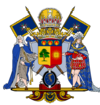Louis Thuylemans: Difference between revisions
No edit summary |
|||
| Line 67: | Line 67: | ||
{{start box}} | {{start box}} | ||
{{succession box|title=[[Steward of Shireroth]]|before=[[Chrysostom Wythe]]|after= | {{succession box|title=[[Steward of Shireroth]]|before=[[Chrysostom Wythe]]|after=[[Erasmo Laegel]]|years=1718–1737}} | ||
{{end box}} | {{end box}} | ||
[[Category:Batavia]][[Category:Shireroth]] | [[Category:Batavia]][[Category:Shireroth]] | ||
{{Shireroth nav}} | {{Shireroth nav}} | ||
Revision as of 17:00, 30 December 2024
| Louis Thuylemans | |
 | |
| Full name | Louis Thuylemans |
|---|---|
| Physical information | |
| Species | Human |
| Gender | Male |
| Hair color and style | Brown |
| Eye color | green |
| Skin color | white |
| Biographical information | |
| Father | Christiaan Thuylemans |
| Mother | Joke van Vleerboesen |
| Spouse |
|
| Date of birth | 1668 AN (aged 85 years) |
| Place of birth | Boschkapelle, Austrasië |
| Residence(s) | 's Koningenwaarde |
| Nationality | Batavian (Shirerithian) |
| Allegiance(s) | The Golden Mango Throne |
| Occupation |
Economics professor |
Louis Thuylemans (born 1668) is a Shirerithian–Batavian politician who serves as Steward of Shireroth (since 1718) and formerly also as Prime minister of Batavia (1713–1718). Since 1698 he is also the president of the Ultraroyalist Party. He's often described as a rather 'boring man' and a 'paper grinder' who prefers to avoid conflict and seeks compromises wherever possible. He's known to be a staunch royalist, and ever since his college years (when Salome acted as Staatsholder of Batavia) he actively supported the Shirerithian cause. He was one of the driving forces behind the integration of the Kingdom into the Imperial Republic of Shireroth in the early 18th century.
In 1717, he was elected to the Folksraad, and then named Steward of Shireroth on 1.VIII.1718 after a coalition agreement between the Mango-Strengthening Movement, the Association of Loyalists to the Throne, the Reform Society, the National Development Party of Talenore, the Conservative Monarchist Party, the Imperial Democratic Party, and his own Ultraroyalist Party was signed. His cabinet was promulgated by the Kaiseress on the same date.
Early life
Louis was born in the town of Boschkapelle in the province of Austrasië. As second son of the local tailor, he grew an interest in accounting. Originally planning to serve as clerk in the Holy Catologian Church, his skills were noticed by the local lord of Boschkapelle. He received a college fund and went to study at the Ecclesiastical Academy in Pentapolis. During this time, Salome had become Staatsholder of Batavia, and despite her short reign, the government was able to invest heavily in the development of its educational institutions.
Louis eventually graduated as an economics professor and moved to 's Koningenwaarde, where he became increasingly invested in politics. In 1698 AN he replaced his mentor, Joseph-Bartholomeus des Vinandy-Windsor as president of the Ultraroyalisten.
Prime Minister of Batavia
Steward of Shireroth
First Years

Due to his reputation as a grey mouse, Thuylemans was chosen as a compromise candidate to offset the balance of the Jingdaoese and Kildarian politicians within the new administration. His tenure began in 1718 AN with the establishment of the Thuylemans Government.
From the very start, one of the main issues that Thuylemans had to deal with was the difficult task of balancing the competing interests of the various political factions within the Imperial Republic of Shireroth. This included navigating tensions between different ethnic groups, such as the Jingdaoese and Kildari, as well as dealing with disagreements among members of his own party, the Ultraroyalisten.
An economical growth due to a mix of market liberalism and limited state subsidies, which helped in the first steps of modernizing not only the military-industrial complex but also - primarily even - aid in the expansion of the agriculture and industries focused on customer goods. For the first time, and perhaps thanks to the lessons which had led to the Kalirion Fracture and decline of the Jingdaoese economy during the Post-Chidao Troubles, a government pushed for the expansion of industries which did not focus mainly on the military.
Grateful for the successes of his predecessor, Chrysostom Wythe, who he often asked for advise till the moment of his death, he inquired for the construction of a tomb in the Valley of Mors. He found immediate approval and agreement from the Imperial Mango Court, with Kaiseress Salome remembering her Steward with much fondness.
Social and educational reforms were introduced, and were kicked off in local communities to test the successes and its working points. Combined with attempts to strengthen ties between the Empire's several ethnic groups, the military reforms were mostly put on the backbench until 1723 AN.
By the arrival of the new election year,it became increasingly clear that Thuylemans had to contend with external pressures from neighboring nations, including the threat posed by the - by many within his government perceived - expansionist state of Benacian Union. As a Batavian himself, he had supported the ascension of Batavia into Shireroth as one of its Dominions to protect it against the Benacians. The hope that being part of a nation which was allied with them, had given Louis the peace of mind he had hoped to find. Now, he saw a political scenery in which Shirerithian Humanists - supported by Chryse, which was actively training a new Humanist political elite in Shirekeep - were too closely intertwined with a foreign power. He found it extremely alarming, but pushed for peaceful resolutions and often countered the more aggressive within his own cabinet. This neutral approach didn't stop him from taking a harsh stance on the Florian issue which had arisen during the Floria–Shireroth diplomatic conflict and ask for its removal from the Raspur Pact.
Path to War
As the election year of 1729 neared, Louis' government intensified its crackdown on the National Humanists. Growing demands within the government called for banning the Humanists from holding political positions, as many saw them as a foreign threat. Even Steward Thuylemans, who had previously resisted such measures, found himself under increasing pressure from both an outspoken Humanist faction in the Folksraad and his own allies. There was mounting urgency to neutralize what was perceived as an infiltrating danger within the nation.
Ironically, one of the key figures pushing for action was Robrecht de Speer, a fellow Batavian who had been accused of having ties to the Imperial Humanist Party of Shireroth. In a letter to Thuylemans, de Speer warned that unless the government struck hard against the Humanists, they would retaliate with even greater force and without mercy.
Meanwhile, Thuylemans' health began to deteriorate, a fact that the Legislature became increasingly aware of. Despite this, the government managed to conceal the Steward’s condition from the public through strict censorship. Under the watchful eye of the SSHIT and the Tegong, newspapers and media outlets were closely monitored. As the government grew anxious about the potential for the Humanists to gain more power, it made the decision to postpone the 1729 elections, with the backing of the Mango-Strengthening Movement and its coalition partners. Thuylemans' illness and a subsequent fall only reinforced the need for the delay.
This decision, however, was not well received across the nation. Protests and conflicts erupted, particularly in Sathrati, as unrest grew over the government's heavy-handed measures and delays in the democratic process. The restriction of travel between Shireroth and foreign countries, along with increasing skirmishes along the Elwynn River, heightened tensions between Shireroth and Benacia under the Steward’s rule.
By 1731, the outbreak of the Sathrati Emergency crushed any remaining hope for new elections among those foolish enough to hope for it. The government’s earlier promises were abandoned as the crisis escalated. Then, in 1733, war broke out between the Benecian Union and Shireroth. The stress of the war, combined with the destruction caused by a nuclear explosion on Lichkeep —which shattered a vase belonging to his grandmother— caused Thuylemans to suffer a minor heart attack.
Fearing for his life and seeking to protect the government from the escalating conflict, Thuylemans made the decision to relocate the government and the Legislature (and especially the Landsraad) to Novi Nigrad in 1734 AN, at a a distant and safer location on the island of Yardistan, far from the front lines. This move marked the beginning of the final phase of Louis’ troubled government as the nation descended further into war and political turmoil.
| Preceded by: Chrysostom Wythe |
Steward of Shireroth 1718–1737 |
Succeeded by Erasmo Laegel |
| |||||||||||||||||||||||||||||||||||||
